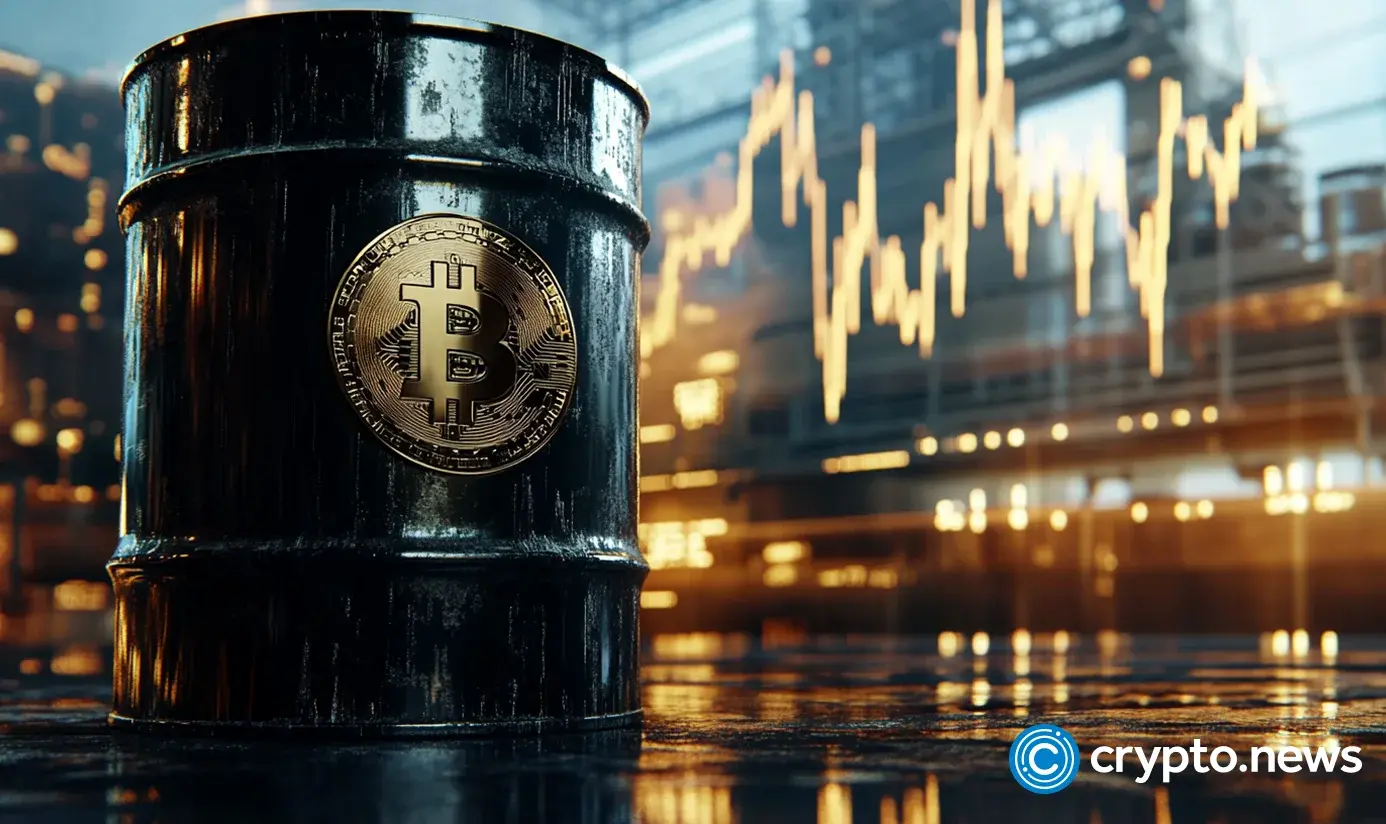Disclosure: The views and opinions expressed here belong solely to the author and do not represent the views and opinions of crypto.news’ editorial.
Despite ostensibly being very different assets, Bitcoin (BTC) and oil share a lot in common. They’re both commodities, for one thing, and are famously hard to extract. Significant work is required to obtain them through mining and drilling, respectively. They also lie at the bedrock of global industries: oil as the basis for manufacturing and energy production; Bitcoin as the backbone of digital asset creation and onchain liquidity. You can build cool stuff using the raw materials that are Bitcoin and oil, from permissionless lending products to children’s toys.
Summary
- The Bitcoin–oil fusion: Tokenizing oil futures and backing them with Bitcoin as collateral could create censorship-resistant synthetic commodities that merge real-world utility with digital liquidity.
- BTC serves as collateral for tokenized oil contracts, enabling global, permissionless trading beyond traditional banking rails — particularly appealing for nations or entities restricted from the dollar system.
- Despite regulatory challenges, BTC-backed oil could pioneer a new class of programmable, onchain commodities — unlocking liquidity, enabling fractional participation, and redefining how global markets price and trade energy.
What would happen, then, if you were to combine the two? Tokenizing oil and backing it with Bitcoin as collateral might sound like a madcap idea the first time you hear it floated. But when you dive a little deeper, it’s not nearly as harebrained as it sounds. In fact, there’s a compelling case for doing so to create a new category of synthetic, censorship-resistant commodities.
The case for combining commodities
In the last two years, the rise of tokenized real-world assets has seen everything from gold to stocks placed onchain, enabling them to be traded, borrowed against, and fractionalized 24/7. Oil has not been exempt from this revolution, which has elevated RWAs into a $28 billion sector. Of course, it’s one thing to be able to trade a token pegged to the price of a barrel of crude; quite another to tokenize the entire oil futures market with bitcoin serving as collateral.
How would it work exactly? What would the benefits be? And just as importantly, who would benefit?
The idea of tokenizing oil futures using Bitcoin as collateral has been circulating for a while, but it’s now starting to be taken seriously. The infrastructure for asset tokenization, issuance, and trading is all in place, while BTC is rapidly becoming the preferred collateral for backing everything from stablecoins to lending markets. Its liquidity, suitability as a store of value, and comparatively low volatility make it the obvious choice for backing virtually any kind of tokenized asset — oil included. But what would such a commodity combo look like in practice?
Physical oil meets digital gold
Oil futures are already a thriving market, enabling speculators and producers alike to enter into contracts that compel them to buy or sell oil at a future date. These contracts, usually denominated in a size of 1,000 barrels of WTI, will trade for $65,000 each if the price is $65 a barrel. Naturally, the price of a barrel of oil fluctuates with global supply, demand, and the usual geopolitical events.
Converting oil futures contracts — agreements to buy or sell oil at a predetermined price on a future date — into blockchain-based tokens is relatively straightforward. Adding Bitcoin into the mix, however, adds another dimension. Because Bitcoin is apolitical and beyond the control of any single nation, it is to all intents and purposes an agnostic means of payment and unit of account.
Everyone can access BTC, and no one can restrict it: the Bitcoin ledger is beyond the purview of agencies such as OFAC that dictate the countries and counterparties that can trade. This is particularly valuable when dealing with oil, a resource that comes from some of the most controversial and financially blacklisted countries in the world. It’s impossible to avoid politics when dealing with oil, which is why Bitcoin could be the ideal currency for oiling the rails required to access it.
Such an instrument would likely appeal to nations sidelined from the global financial system, such as those excluded from SWIFT or under sanctions. The ability to trade energy commodities without relying on traditional banking rails is an attractive proposition. And given the dominance of such nations in oil production, this is basic common sense: we don’t apply network-enforced sanctions to BTC transactions. Why should we do the same for oil, a vital resource that is every bit as global and one of the raw materials of the global economy?
Who’s gonna build it?
While BTC’s ability to ease payment flows, serving as a censorship-resistant and liquid unit of account, is unrivaled, there are some potential sticking points with bitcoin-backed oil futures. The most obvious question is who would be willing to build such a platform. U.S. companies are automatically out of the question, since a willingness to do business with sanctions-hit countries would instantly land them in hot water.
Of course, they could just vet all users — as RWA platforms currently do — in order to meter access, but that kind of defeats the point of backing it with a global, censorship-resistant cryptocurrency; might as well use USD Coin (USDC). The solution to this impasse would be to create a permissionless, decentralized protocol that anyone can access, forming a universal system for trading oil futures. The benefits of such a protocol extend far beyond speculating on the price of WTI: using the composability that is DeFi’s stock-in-trade, a wealth of financial products could be built upon this powerful primitive.
More than just oil
By blending the liquidity of crypto with the stability of physical commodities, BTC-backed oil could pioneer synthetic assets that resist censorship, enabling programmable, borderless finance in a volatile world. For instance, tokenized oil could serve as collateral in decentralized finance protocols, allowing investors to generate yield or bundle it into multi-asset portfolios. It could be borrowed against and used to issue yield-bearing stablecoins, enhancing capital efficiency.
If scaled successfully, this could birth an entirely new class of assets: synthetic commodities that combine the scarcity of Bitcoin with the real-world utility of oil, offering resilience against geopolitical disruptions and regulatory overreach. And because tokenization enables fractionalization, you wouldn’t need a $65,000 contract to participate — $100 would do, transforming oil into a globally tradable commodity.
Investors would post BTC as collateral to open or maintain positions in tokenized oil futures, using the same formula that enables onchain margin trading. Bitcoin’s volatility would be mitigated through over-collateralization and automated liquidations, ensuring positions remain solvent. And of course, smart contracts would automate the entire lifecycle, from collateral management and margin calls to settlement. Finally, integration with DeFi would allow for using tokenized oil as collateral for loans or yield farming, creating a programmable financial ecosystem that operates 24/7.
The bull case for Bitcoin-backed oil
One of the primary benefits of RWA tokenization is that it democratizes access to illiquid commodities, allowing instant transfers and fractional trading. This could unlock billions in trapped capital, with blockchain enabling near-instant settlements, reducing the delays in traditional markets, and eliminating geographic barriers. Combining energy markets with blockchain liquidity would provide a global window into the mood of the markets — and thus the world — around the clock.
Coupled with the ability for tokenized oil to become “smart” collateral, integrable into DeFi for yield generation, lending, or commodity baskets, and the upside to bitcoin-backed oil is evident. The creation of such a solution — or competing solutions — would do more to accelerate RWA tokenization and capital inflows than that of any other asset class.
The catch, of course, and it’s a big one, is that regulators in various jurisdictions — the U.S. chiefly — would take a dim view of their citizens trading such a protocol, knowing that the counterparty could be Russia or Iran or umpteen other countries that have been squeezed out of the dollar-denominated global banking system. Which is why, if such a solution does surface, it’s likely to be developed by one of these marginalized nations.
The demand is there
A permissionless and globally accessible oil futures marketplace backed by BTC looks unlikely to materialize any time soon. But it can be claimed with confidence that the demand for such a product exists, not just among countries on the naughty list, but among traders, DeFi natives, hedge funds, and oil producers the world over. Because there’s already plenty of evidence attesting to the piecemeal efforts being made to engineer solutions that combine oil with blockchain technology.
Some Russian companies are already using BTC for oil trading, while oil and gas deals are currently being tokenized in regions such as Latin America. Crypto traders in regions including the U.S. can currently trade oil futures on regulated exchanges such as Coinbase Derivatives, while the idea of creating oil-backed cryptocurrencies has been generating discussion — albeit with limited delivery — for years.
BTC-backed oil futures are not a radical idea. In fact, there’s a strong case for saying that it’s an idea whose time has come. Natural resources are by their nature unconstrained by borders and arbitrary laws: they exist in pockets all around the world, and they are relied on by all global citizens, either directly or indirectly. And of all such resources, oil is at the top of that list.
More than any other commodity, the price of oil is deeply correlated with macro events, from economic performance to geopolitical conflict. The ability for anyone to trade the same tokenized oil futures — permissionless, censorship-resistant, and fully transparent — would form the ultimate sentiment indicator, with synthetic commodities and non-debasable digital currency forming the foundations of a new financial system.

Cecilia Hsueh
Cecilia Hsueh is the Chief Strategy Officer at cryptocurrency exchange MEXC. A seasoned blockchain entrepreneur and former management consultant with more than a decade of experience in fintech, she previously co-founded Morph, a Layer-2 network, and Phemex, a global crypto exchange she helped scale to over $5 billion in trading volume. Hsueh’s expertise spans web3 adoption, consumer payments, and exchange growth, bringing a holistic perspective to MEXC’s global vision.




